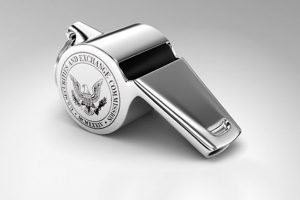
The Securities and Exchange Commission has issued its largest-ever award, a staggering $279 million, to a whistleblower whose information and assistance led to the successful enforcement of SEC and related actions, the regulatory agency said Friday in a statement.
This is the highest award in the SEC’s whistleblower program’s history, more than doubling the $114 million SEC whistleblower award the agency issued in October 2020. The SEC did not identify the whistleblower or the case involved, consistent with its ongoing policy.
“The size of today’s award—the highest in our program’s history—not only incentivizes whistleblowers to come forward with accurate information about potential securities law violations, but also reflects the tremendous success of our whistleblower program,” said Gurbir S. Grewal, director of the SEC’s Division of Enforcement. “This success directly benefits investors, as whistleblower tips have contributed to enforcement actions resulting in orders requiring bad actors to disgorge more than $4 billion in ill-gotten gains and interest. As this award shows, there is a significant incentive for whistleblowers to come forward with accurate information about potential securities law violations.”
The payment was made to a single individual, while two other claimants related to the case were denied payment. Payments to whistleblowers are made out of an investor protection fund, established by Congress, which is financed entirely through monetary sanctions paid to the SEC by securities law violators.
SEC whistleblowers may be eligible for an award when they voluntarily provide the SEC with “original, timely, and credible information” that leads to a successful enforcement action, and adhere to filing requirements in the whistleblower rules set out in the Dodd-Frank Act. Whistleblower awards can range from 10 to 30 percent of the money collected when the monetary sanctions exceed $1 million.
“The whistleblower’s sustained assistance including multiple interviews and written submissions was critical to the success of these actions,” said Creola Kelly, chief of the SEC’s Office of the Whistleblower. “While the whistleblower’s information did not prompt the opening of the Commission’s investigation, their information expanded the scope of misconduct charged.” ![]()

